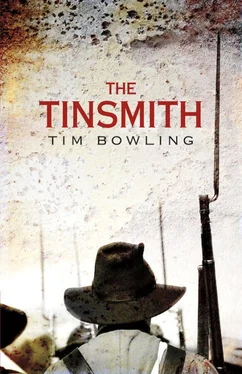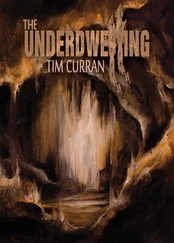Afterwards, he found he could not sit and wait. There was much work to do. If Daney and Caleb were denied the benefits of freedom, many others would not be, but only if the Union won the war. He decided he could help the cause and look for the overseer at the same time. For there was no guarantee Orlett or Cray would return anytime soon or at all. Perhaps both were dead out there among all the other bodies. Perhaps he would come upon one or both of their corpses on the battlefield.
Daybreak approached as he skirted the dark woods and walked out among the groaning wounded. In the thick grey-black light, among the wreckage of knapsacks and overcoats, smashed limbers, discarded weapons, and smoking holes, he discovered a young soldier with blood caked on his eyelids and the bridge of his nose. He looked to be sleeping. John put his head to the soldier’s chest and thought he heard a faint beating. He picked the soldier up and gazed to the east; somewhere in that direction he expected to see activity, evidence of a hospital at work or a campsite of soldiers stirring with the dawn. Instead he saw a single black tree, its branches shattered but for one, the air a slightly fainter black around it. He moved on, the soldier’s head cradled in the crook of his arm. The white face, stained with blood and powder, moved him strangely. It was young enough to be one of Daney’s children.
A groan just off to the left broke his odd reverie. It came from a much older soldier, a middle-aged, rough-bearded man with a wound in his neck. He lay on his back, his eyes fluttering. John laid the young soldier down and, on his knees, took the older man onto his back and shoulders. Then, with as much care as possible, he clasped the lighter soldier to his waist, letting the feet drag along the ground. Hunched over, he proceeded slowly, stopping every minute to catch his breath.
More grey light spread over the field and sky. The one tree loomed on the horizon yet never seemed to come any closer. Already the air was poisonous with the gases of the dead. He kept going. Over the pounding of the blood in his temples and his laboured breathing, he heard little. Once, panicked, he thought he heard several quick retorts, like musket fire. He lifted his head and peered around him, but he could see nothing except the same shattered ground of dead horses and tipped-over wagons. Again he moved on.
At last he stopped, figuring that he must have come abreast of the tree because he could not see it. Suddenly he knew he was being watched. The idea that it was Orlett flashed into his mind, but he could not react quickly on account of the wounded he carried. He turned his head slowly, his muscles taut.
A man stood almost directly against the black tree. He wore a kind of smock covered in gore. His face, though mostly hidden under a thick beard, was kind and vaguely familiar, the eyes dark and wet. They were like Caleb’s eyes.
“Let me take the other man, soldier,” he said and stepped around John to tend to the body he had laid on the ground.
“Thank you, sir.”
“The hospital’s back there.” The man, who must have been a surgeon, pointed eastward. Then he tended to the young soldier, taking up one of his wrists, leaning to his chest, touching his eyelids. The man’s shoulders sagged. He looked up.
John recognized him now as one of the surgeons from the day of the battle. Comforted, he lowered the other soldier to the ground. The doctor probed the wound in the neck with his finger, then muttered something John did not catch.
“Sir?”
“Your name?” he said gently.
John touched the letters on his cheek. His name? When was the last time a white man had even asked him for it?
“John.”
“John? What’s the rest of it?”
Suddenly a voice cried, “Don’t move!”
His heart lurched. It was the cry he had dreaded hearing the whole way from South Carolina, the cry of recapture. He turned and saw two Union soldiers pointing their muskets at him.
The doctor said, “It’s all right, I’m a surgeon. We’re taking this wounded man to the hospital.”
The soldiers stepped closer. They stared at the doctor a while, then nodded and withdrew into the shreds of remaining dark.
John controlled his breathing. “Just the one man, sir?”
The doctor sighed.
“The other’s dead. A burial party will take care of him. Was he a comrade of yours?”
“No. But I reckoned he’d make it.” But what he wanted to say was, I couldn’t leave him, he’s just a child, his mother will be missing him. Because the doctor looked as if he’d understand, he looked as if he’d do anything to save a child’s life. Now he raised his face to the sky and scowled.
“Pick him up and follow me,” he said softly.
John did so, thinking, this man will help me if I need it, this man with Caleb’s eyes. Caleb. A cluster of hospital tents emerged from the ground. Then a bugle sounded. John stopped and swung around. He almost expected Orlett and Cray to come galloping across the battlefield.
“Baird! Where the hell have you been?”
An elderly man in a smock drenched with blood strode through the tents toward them. John lowered the soldier to the ground and slipped away. Behind him he could hear the same man shouting. His voice carried through the dawn stillness, then stopped.
John kept as low as possible to the ground, fearing that the uniform might not be enough of a shield. From a safe distance he saw Union troops gathering into lines, saw other buildings that had been turned into makeshift hospitals. The dead and wounded lay everywhere in the grass. He had to take several detours to avoid others who were searching the battlefield, but then he realized that he was almost invisible. At least no one seemed to find his wandering presence unusual. Whatever soldiers had been posted as lookouts must have been ordered to concentrate their attention closer to where the confederates held the line. He had been so focused on his own doings that it came as a sudden shock to think that the battle might be renewed. A periodic crackle of rifle fire served as a sharp reminder. He kept low, and trusted to his instincts to alert him to the overseer’s presence.
The day grew warm, then hot. He dispensed what water he had found in the canteens of the dead to the suffering wounded, those who had fallen outside of the disputed ground, and carried several other fallen soldiers to hospitals. The whole time he kept Daney’s fiery eyes before him, but they kept turning into Caleb’s unseeing ones with the dirt showering down. And as that grave filled, it became a black depth of water from which the bodies of Daney and her girls and the other women slowly surfaced. He could shut the image out only by concentrating on the one face that, more than all things, had brought him this far. He sometimes wondered if he would have been able to escape the South if not for his hatred of the overseer.
In the afternoon, the heavens opened. For an hour the rain poured down so that the battlefield indeed seemed like a river bottom crowded with sodden bodies. He took shelter in a canvas tent in which two wounded soldiers lay; neither moved, but he could hear their breathing. The air stank of rot and chemicals. The rain beat heavily against the canvas and then, all of a sudden, stopped.
When he emerged, he saw that he was very near to the field hospital where he’d walked with the doctor at daybreak. It was midday. There’d been no sign of the overseer or the mulatto. Several civilians, including some women dressed in fine clothes, had appeared on the battlefield. Mostly they just held their hands up to their noses and gazed around, wide-eyed. It seemed, by the time that he approached the hospital again, that Orlett and Cray must have left Sharpsburg or been killed. The idea both disappointed and relieved him. Despite his hatred, he remained uncertain of his ability to kill, knowing that Caleb, right about so many things, could be right about that too. And besides, he knew the overseer would not be easy to kill; that much evil couldn’t be overcome without a struggle. He wondered if he possessed the courage and the strength to do the job. But one thing was clear enough: he could do his part for the future that Daney had predicted.
Читать дальше












